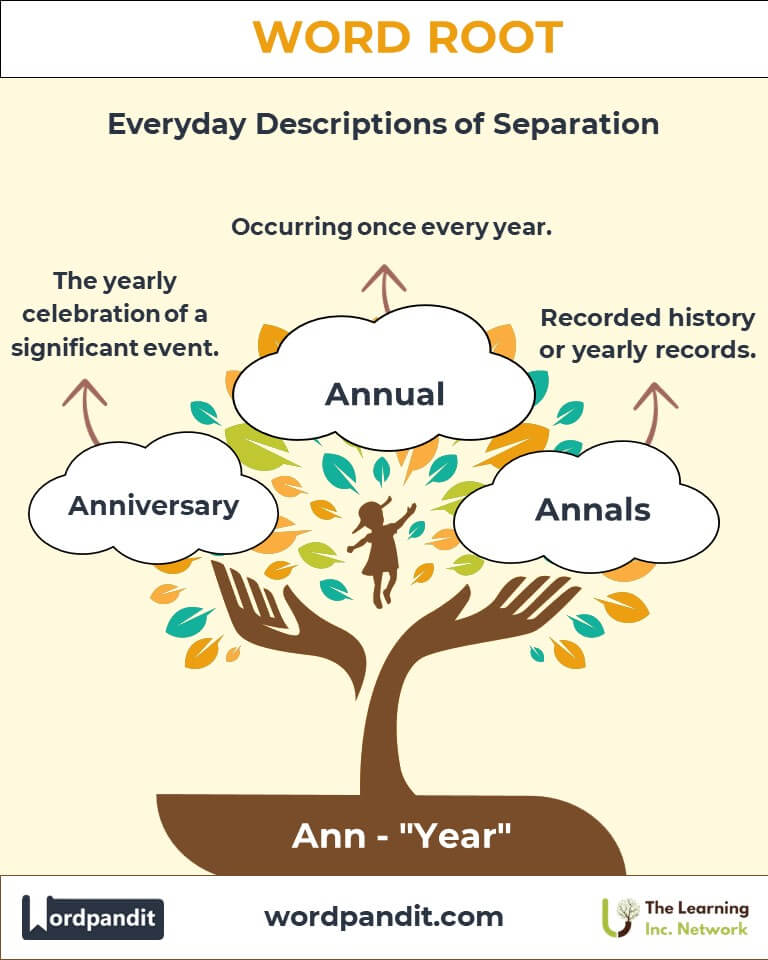Ann: A Timeless Connection to Years and Celebrations
Discover the legacy of the Latin root "Ann" and its variant "Enn," both signifying "year." This root serves as the foundation for terms tied to time, milestones, and longevity, influencing everything from everyday expressions to historical records.

Table of Contents
- Introduction: The Language of Time with "Ann"
- Etymology and Historical Journey
- Mnemonic: Unlocking the Power of Ann
- Common Ann-Related Terms
- Ann Through Time
- Ann in Specialized Fields
- Illustrative Story: Ann in Action
- Cultural Significance of the Ann Root
- The Ann Family Tree
- FAQs About the Ann Word Root
- Test Your Knowledge: Ann Word Root Mastery Quiz
- Conclusion: The Enduring Legacy of Ann
1. Introduction: The Language of Time with "Ann"
What makes the passage of time so significant that we celebrate it with anniversaries, centennials, and millennia? The Latin root "Ann" (pronounced "an") and its variant "Enn" derive from annus, meaning "year." This linguistic cornerstone shapes a wealth of terms related to annual events, durations, and celebrations. Exploring "Ann" reveals its profound influence on language and its symbolic connection to life’s milestones.

2. Etymology and Historical Journey
The word root "Ann" originates from the Latin word annus, meaning "year." Ancient Roman calendars were closely tied to natural cycles, marking annual events such as Saturnalia. As Latin evolved, its vocabulary influenced many languages, including English, embedding "Ann" into terms celebrating yearly cycles and significant durations.
- Saturnalia: Annual Roman festivals celebrating the solstice.
- Anno Domini (AD): Dating system translating to "in the year of our Lord."
- Spread through medieval texts, terms like annals became central to recording history.
3. Mnemonic: Unlocking the Power of Ann
To remember "Ann," think of an annual family gathering marked by joy and tradition. Picture a banner reading, “Happy Anniversary!”—a visual cue connecting the root to recurring yearly events.
Mnemonic: “Ann” anchors annual occasions like birthdays, anniversaries, and New Year’s celebrations.
4. Common Ann-Related Terms
- Annual (an-yoo-uhl): Happening once a year.
Example: "The town’s annual carnival is a beloved tradition." - Anniversary (an-uh-vur-suh-ree): Yearly commemoration of an event.
Example: "They celebrated their 25th wedding anniversary with a grand party." - Centennial (sen-ten-ee-uhl): The 100th anniversary of something.
Example: "The museum organized an exhibition for its centennial." - Biannual (bye-an-yoo-uhl): Occurring twice a year.
Example: "The board holds biannual strategy meetings." - Perennial (puh-ren-ee-uhl): Lasting for many years; recurring regularly.
Example: "Roses are a perennial favorite among gardeners."
5. Ann Through Time
- Anno Domini (AD): Adopted in medieval Europe to denote years post-Christ’s birth, transforming timekeeping conventions.
- Annuity: Originated as payments tied to land rents; now pivotal in financial planning for structured payouts.
- Millennium: Once signifying vast epochs, it gained modern relevance during the Y2K era.
6. Ann in Specialized Fields
- Finance:
Term: Annuity – Fixed yearly payments, vital for retirement planning.
Example: "Many retirees depend on annuities for stable income." - Botany:
Term: Perennial – Refers to plants living multiple years.
Example: "Perennial plants like daffodils bloom annually." - History:
Term: Annals – Chronological records of yearly events.
Example: "Scholars use ancient annals to reconstruct history." - Cultural Celebrations:
Term: Sesquicentennial – A 150th anniversary.
Example: "The city celebrated its sesquicentennial with parades."
7. Illustrative Story: Ann in Action
Dr. Marianne "Ann" Lester, a historian, was entrusted with verifying an ancient manuscript described as part of the "Annals of Rome." Her work deciphering faded inscriptions and cross-referencing timelines uncovered its authenticity. The discovery added to our understanding of Roman governance, highlighting the pivotal role of yearly records in preserving history.
8. Cultural Significance of the Ann Root
From Chinese New Year to Indian Diwali, cultures worldwide mark time with annual festivals symbolizing renewal and continuity. These traditions, rooted in the "Ann" concept, celebrate humanity’s connection to the cycles of nature and the significance of milestones.

9. The Ann Family Tree
- Chron- (time):
Example: Chronology – The sequential arrangement of events. - Temp- (time):
Example: Temporary – Lasting for a limited period. - Enn- (variant of Ann):
Example: Biennial – Happening every two years. - Secul- (age/era):
Example: Secular – Spanning long periods or unrelated to religion.
FAQs About the "Ann" Word Root
Q: What does the root "Ann" mean?
A: The root "Ann" originates from the Latin word annus, meaning "year." It is found in words related to time, yearly events, and long durations.
Q: What does "perennial" mean?
A: "Perennial" refers to something enduring for many years or recurring regularly. For example, perennial plants regrow annually without needing to be replanted.
Q: What is the meaning of "biannual" versus "biennial"?
A:
- Biannual means "twice a year," combining "bi-" (two) with "annual."
- Biennial means "every two years," combining "bi-" (two) with "ennial."
Q: What is a centennial?
A: A centennial marks the 100th anniversary of an event. For example, a city's centennial might be celebrated with parades and historical exhibits.
Q: How is "Ann" used in calendars and dating systems?
A: "Ann" appears in phrases like Anno Domini (AD), which translates to "in the year of our Lord." It forms the foundation of our modern Gregorian calendar system.
Test Your Knowledge: Ann Word Root Mastery Quiz
1. What does the root "Ann" mean?
2. What is the term for a 100th anniversary?
3. How often does a biannual event occur?
4. What does "perennial" describe?
5. Which of these is derived from "Ann"?
12. Conclusion: The Enduring Legacy of Ann
The root "Ann" bridges past, present, and future, encapsulating humanity’s connection to time. From marking anniversaries to structuring financial stability, this root’s influence spans cultures and disciplines. As we continue to honor milestones and reflect on history, "Ann" remains a linguistic reminder of the cyclical nature of life and time.














